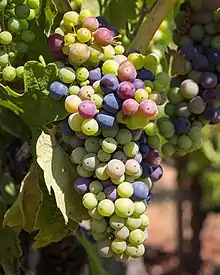< Reconstruction:Proto-Slavic
Reconstruction:Proto-Slavic/viňaga
Proto-Slavic
Etymology
Unclear. Usually interpreted as *vīnò (“vine”) + *àga (“berry”), for similar compunds compare Lithuanian vỹnuogė, Proto-Germanic *wīnabasją. However, prothetic -j- suggests late, maybe even post-Proto-Slavic etymology. On the other hand, *àga has been displaced by *àgoda and is unattested, which makes late creation problematic.
Alternatively from *vīnò + *-jaga or back-formation from *vīňàgoda.
Accentological notes
According to the Bulakhovsky’s rule, “before what was a word-medial pre-tonal acute long vowel, Proto-Slavic long vowels were shortened.”,[1] it is necessary to reconstruct the form as *viňàga. However, apparently, this rule of classical accentology is not used by Rick Derksen, cf. *sǭdìti. A long vowel is restored by deduction from *vīnò.
Inflection
Declension of *vīňàga (hard a-stem, accent paradigm a)
| singular | dual | plural | |
|---|---|---|---|
| nominative | *vīňàga | *vīňàdzě | *vīňàgy |
| genitive | *vīňàgy | *vīňàgu | *vīňàgъ |
| dative | *vīňàdzě | *vīňàgama | *vīňàgamъ |
| accusative | *vīňàgǫ | *vīňàdzě | *vīňàgy |
| instrumental | *vīňàgojǫ, *vīňàgǭ** | *vīňàgama | *vīňàgamī |
| locative | *vīňàdzě | *vīňàgu | *vīňàgasъ, *vīňàgaxъ* |
| vocative | *vīňàgo | *vīňàdzě | *vīňàgy |
* -asъ is the expected Balto-Slavic form but is found only in some Old Czech documents; -axъ is found everywhere else and is formed by analogy with other locative plurals in -xъ.
** The second form occurs in languages that contract early across /j/ (e.g. Czech), while the first form occurs in languages that do not (e.g. Russian).
** The second form occurs in languages that contract early across /j/ (e.g. Czech), while the first form occurs in languages that do not (e.g. Russian).
Descendants
Further reading
- Derksen, Rick (2008) “àgoda”, in Etymological Dictionary of the Slavic Inherited Lexicon (Leiden Indo-European Etymological Dictionary Series; 4), Leiden, Boston: Brill, →ISBN, →ISSN, page 27
- Trubachyov, Oleg, editor (1974), “*agoda”, in Этимологический словарь славянских языков [Etymological dictionary of Slavic languages] (in Russian), numbers 1 (*a – *besědьlivъ), Moscow: Nauka, page 57
- Melnychuk, O. S., editor (2012), “ягода”, in Етимологічний словник української мови [Etymological Dictionary of the Ukrainian Language] (in Ukrainian), volumes 6 (У – Я), Kyiv: Naukova Dumka, →ISBN
- Vasmer, Max (1964–1973) “ягода”, in Oleg Trubachyov, transl., Этимологический словарь русского языка [Etymological Dictionary of the Russian Language] (in Russian), Moscow: Progress
- Mallory, J. P., Adams, D. Q., editors (1997), Encyclopedia of Indo-European culture, London, Chicago: Fitzroy Dearborn Publishers, page 644
- Pronk-Tiethoff, Saskia E. (2013) The Germanic loanwords in Proto-Slavic, Amsterdam - New York: Rodopi, →ISBN
- Berezovich, Elena L., et al. (2002) Словарь говоров Русского Севера [Dictionary of dialects of the Russian North] (in Russian), volume 2, Ekaterinburg: Publishing House of the Ural State University, →ISBN, page 113: “виня́га ― vinjága”
- Snoj, Marko (2016) “jágoda”, in Slovenski etimološki slovar [Slovenian Etymology Dictionary] (in Slovene), 3rd edition, https://fran.si: “ohranjeno morda v nar. sloven. vinjága, hrv. vìnjaga ‛divja trta’”
References
- Dybo, Vladimir A. (2000) Морфонологизованные парадигматические акцентные системы: Типология и генезис [Morphophonologized paradigmatic accent systems: Typology and genesis] (in Russian), volume 1, Moscow: LRC Publishing House, →ISBN, page 84
- Sławski, Franciszek, editor (1974), “agoda”, in Słownik prasłowiański [Proto-Slavic Dictionary] (in Polish), volumes 1 (a – bьzděti), Wrocław: Ossolineum, page 152
This article is issued from Wiktionary. The text is licensed under Creative Commons - Attribution - Sharealike. Additional terms may apply for the media files.
